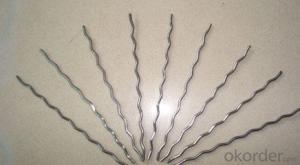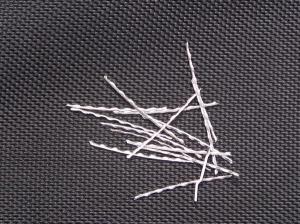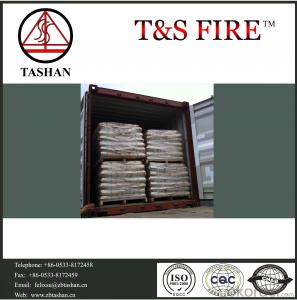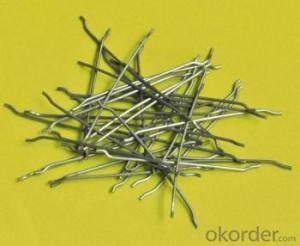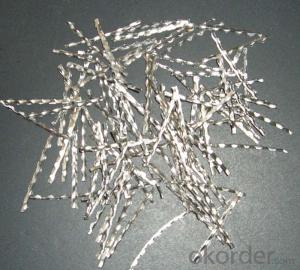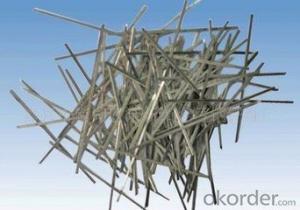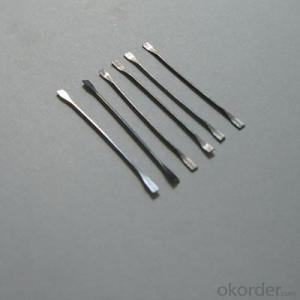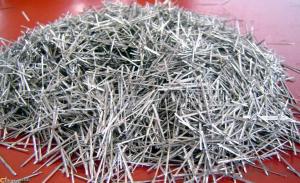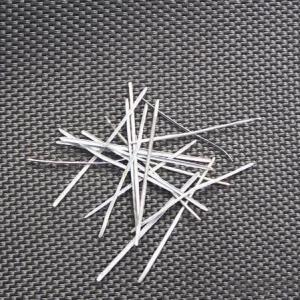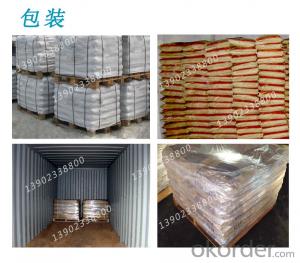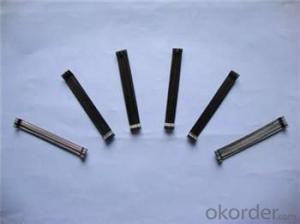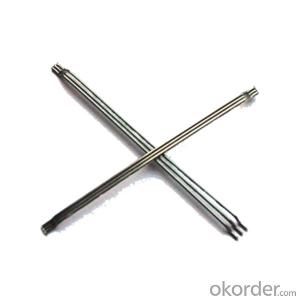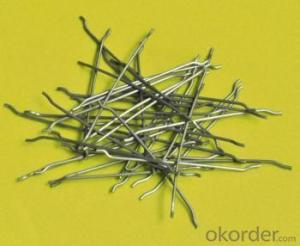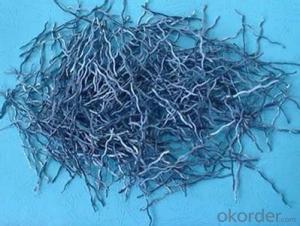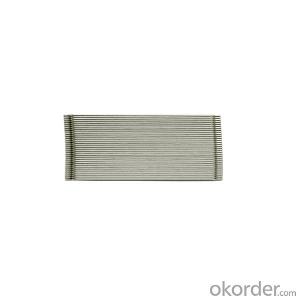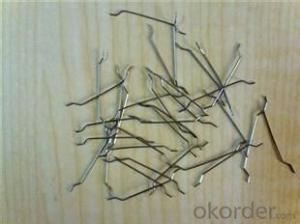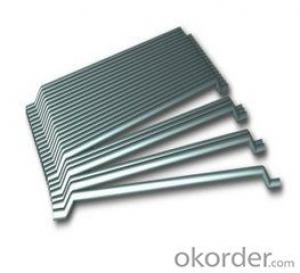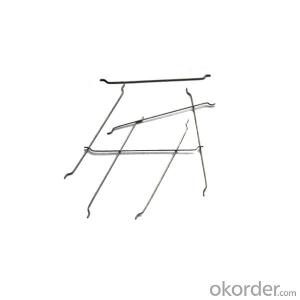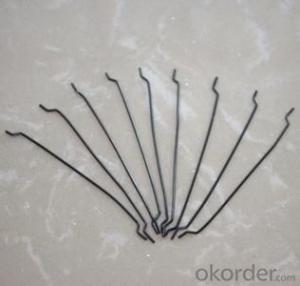Steel Fiber Reinforced Stainless For Good Concrete Admixtures
- Loading Port:
- Tianjin
- Payment Terms:
- TT OR LC
- Min Order Qty:
- 2000 kg
- Supply Capability:
- 250000 kg/month
OKorder Service Pledge
OKorder Financial Service
You Might Also Like
Quick Details
Place of Origin: Hebei, China (Mainland)
Model Number: CW04
Material: Steel
Material:: Steel,low carbon steel wire
Standard:: ASTM ,ISO9001,CE
Shape:: hooked ends and straight middle
Grade:: Q195
Application:: shortcrete on tunnel, underground project, dam plate
Tensile strength:: 1100MPA to 2850Mpa
Demension:: per your requirement
Place of Origin:: HeBei China (Mainland)
Delivery Detail:: in 7 days upon receive prepayment
Product features
with excellent tensile ,hightenacity ,against cracking and fatigue ,they`re widely usd in the structures made of concrete 50X1.0 mm cold drawn stainless steel fiber with 1200 Mpa, used for production of reinforced concrete Stainless steel fiber with high tensile strength is ideal for reinforcing concrete. High quality cold drawn steel fiber improves concrete's resistance and allows to use thinner layer of concrete, reducing construction costs.Fiber can be manufactured as per customer's specifications. Please enquire for a price quotaton based on your requirements FOB Saint Petersburg price is available upon request.
Specifications
1.hooked steel fiber
2.CE and ISO9001:2008
3.diameter from 0.5mm to 1.2mm
4.competitive price,high quality and service
Hooked Steel Fiber:
1.Diameter:0.5mm-1.0mm
2.Length: 25mm-60mm
3.Material: low carbon steel wire
4.Feature: excellent tensile,high tenacity,against cracking,impact and fatigue
5.Uses: high way,tunnel,building,airport road serface and so on .
Picture
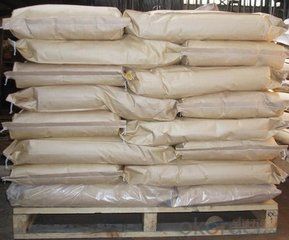
FOB Saint Petersburg price is available upon request
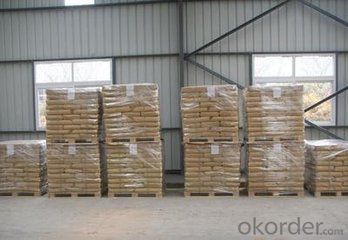
good quality and competitive price
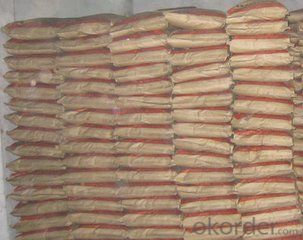
steel fiber concrete reinforced
FAQ
astm a820 steel fiber,carbon steel fibers
we can produce any type steel fiber and of course we can make production according to your requirement
we have specilize in this field for almost 10 years ,with good quality and competitive price
- Q:What is the optimal fiber volume fraction for melt extract stainless steel fiber in concrete?
- The optimal fiber volume fraction for melt extract stainless steel fiber in concrete typically ranges between 0.5% to 2% by volume, depending on the specific application and desired performance properties.
- Q:Can melt extract stainless steel fiber be used in pre-stressed concrete?
- Yes, melt extract stainless steel fiber can be used in pre-stressed concrete. The addition of stainless steel fibers in pre-stressed concrete can provide increased ductility and crack resistance, enhancing the overall performance and durability of the concrete structure. The stainless steel fibers act as reinforcement by dispersing the stress and preventing the propagation of cracks. This helps to improve the structural integrity of the pre-stressed concrete and increases its resistance to mechanical and environmental stresses. Additionally, the use of melt extract stainless steel fibers in pre-stressed concrete can also contribute to reducing the potential for corrosion, as stainless steel is highly resistant to rust and other forms of degradation. Overall, the incorporation of melt extract stainless steel fibers in pre-stressed concrete can improve its strength, flexibility, and longevity.
- Q:Can melt extract stainless steel fiber be used in the construction of precast concrete walls?
- Precast concrete walls can benefit from the utilization of melt extract stainless steel fiber. Specifically engineered to improve the mechanical attributes and longevity of concrete, these fibers are frequently employed to enhance tensile strength, flexural strength, and crack resistance in concrete structures. Upon introduction into the concrete mixture, stainless steel fibers establish a three-dimensional reinforcement network within the concrete matrix. This network serves to distribute internal stresses and prevent the propagation of cracks, resulting in enhanced structural integrity and extended lifespan for precast concrete walls. Furthermore, melt extract stainless steel fibers possess outstanding resistance to corrosion and are capable of withstanding exposure to harsh environmental conditions, including high temperatures, chemicals, and moisture. Consequently, they are well-suited for incorporation into precast concrete walls, which may encounter a variety of external factors. In summary, the inclusion of melt extract stainless steel fibers can effectively heighten the performance and durability of precast concrete walls. Their implementation can yield stronger, more resilient structures capable of withstanding the demands of construction and providing long-lasting advantages.
- Q:How does melt extract stainless steel fiber improve the freeze-thaw resistance of concrete?
- Melt extract stainless steel fiber is an innovative material that greatly enhances the freeze-thaw resistance of concrete. This type of fiber is derived from stainless steel through a specialized extraction process, which ensures its purity and high-quality characteristics. The freeze-thaw resistance of concrete refers to its ability to withstand the repeated cycles of freezing and thawing that occur in cold weather conditions. When water trapped within the concrete freezes, it expands, exerting pressure on the surrounding material. This pressure can cause cracks, spalling, and other forms of deterioration in the concrete structure over time. By incorporating melt extract stainless steel fibers into the concrete mix, several mechanisms come into play to improve its freeze-thaw resistance. Firstly, the fibers act as reinforcement within the concrete matrix, providing additional tensile strength and reducing the formation and propagation of cracks. This helps to maintain the overall structural integrity of the concrete, even when subjected to freeze-thaw cycles. Moreover, the stainless steel composition of these fibers offers excellent corrosion resistance. Concrete is often exposed to various environmental factors, including the presence of chloride ions from de-icing salts, which can accelerate the corrosion process. However, the stainless steel fibers inhibit the corrosion of embedded reinforcing steel, thereby preserving the concrete's durability and freeze-thaw resistance. Additionally, the presence of melt extract stainless steel fibers enhances the overall durability of the concrete. These fibers improve the cohesion and bond between the aggregate and cement paste, resulting in a more dense and impermeable concrete matrix. This reduces the ingress of water and other harmful substances, such as chloride ions, into the concrete, further safeguarding it against freeze-thaw damage. In conclusion, melt extract stainless steel fiber plays a crucial role in enhancing the freeze-thaw resistance of concrete. By providing reinforcement, corrosion resistance, and improved durability, these fibers effectively mitigate the detrimental effects of freeze-thaw cycles on concrete structures, ensuring their longevity and integrity.
- Q:What is the effect of melt extract stainless steel fiber on the durability of tunnel linings?
- The use of melt extract stainless steel fiber in tunnel linings has a significant impact on their durability. Stainless steel fibers are known for their high tensile strength, corrosion resistance, and thermal stability, making them an ideal choice for reinforcing tunnel structures. One of the main effects of melt extract stainless steel fiber is its ability to enhance the crack resistance of the tunnel linings. When tunnels are subjected to various loads and stresses, such as ground movement or heavy traffic, they are prone to developing cracks. However, the addition of stainless steel fibers helps to distribute the load more evenly, thereby reducing the formation and propagation of cracks. This improvement in crack resistance ultimately enhances the durability of the tunnel linings. Furthermore, melt extract stainless steel fiber also improves the overall strength and stability of tunnel linings. The fibers reinforce the concrete matrix, providing additional strength and preventing the formation of weak points. This increased strength can help the tunnel linings withstand external forces and pressure, such as water infiltration or ground settlement, thereby prolonging their lifespan. Additionally, stainless steel fibers exhibit excellent resistance to corrosion, ensuring the long-term durability of tunnel linings. Tunnels are often exposed to harsh environmental conditions, including moisture, chemicals, and temperature variations, which can accelerate the degradation of traditional reinforcement materials. However, stainless steel fibers are highly resistant to corrosion, making them a reliable choice for enhancing the durability of tunnel linings. Overall, the effect of melt extract stainless steel fiber on the durability of tunnel linings is significant. It improves crack resistance, enhances strength and stability, and provides excellent corrosion resistance. By incorporating these fibers into tunnel construction, engineers can significantly increase the lifespan and reliability of tunnel linings, ensuring their long-term durability.
- Q:Can melt extract stainless steel fiber be used in high-rise building cladding?
- High-rise building cladding can indeed utilize melt extract stainless steel fiber. Renowned for their robustness, resistance to corrosion, and enduring nature, stainless steel fibers prove suitable for an array of construction applications, including cladding. The incorporation of stainless steel fibers into high-rise building cladding bolsters the structure's soundness, endowing it with added safeguarding from external forces, like wind, seismic activities, and impact. Furthermore, stainless steel fibers augment the cladding system's ability to withstand fire, a crucial attribute for high-rise edifices. Nevertheless, it remains imperative to ensure the proper integration of stainless steel fibers into the cladding system, adhering to the requisite codes and standards, to guarantee optimal performance and safety.
- Q:How does melt extract stainless steel fiber affect the rheology of self-compacting concrete?
- The rheology of self-compacting concrete is greatly influenced by the inclusion of melt extract stainless steel fibers. Rheology pertains to the flow characteristics and behavior of a substance, and in the case of self-compacting concrete, it determines its ability to flow and fill intricate forms without mechanical consolidation. The addition of melt extract stainless steel fibers to self-compacting concrete serves as reinforcement, enhancing its mechanical properties. These fibers enhance the structural integrity of the concrete matrix by imparting tensile strength, crack resistance, and improved ductility. This reinforcement effect leads to improved rheological properties of self-compacting concrete. Reducing segregation and bleeding is one of the primary impacts of melt extract stainless steel fibers on the rheology of self-compacting concrete. The fibers aid in the uniform distribution of aggregates, preventing their settlement and resulting in a more homogeneous mixture. This reduces the risk of particle segregation during pouring and casting, resulting in improved flowability and stability of the concrete. In addition, the presence of stainless steel fibers improves the viscosity and yield stress of self-compacting concrete. The fibers form a network within the concrete mixture, increasing its internal friction and resistance to flow. As a result, the slump flow decreases and the concrete exhibits increased resistance to deformation, enabling it to maintain its shape and stability even under its own weight. Moreover, melt extract stainless steel fibers can enhance the cohesiveness and filling capability of self-compacting concrete. The fibers create a bridge between the cementitious matrix and the aggregates, improving their bond. This leads to better workability and flowability, allowing the concrete to effortlessly fill intricate and congested areas without the need for vibration or compaction. In conclusion, melt extract stainless steel fibers positively impact the rheology of self-compacting concrete by reducing segregation and bleeding, improving viscosity and yield stress, and enhancing cohesiveness and filling capability. These fibers contribute to the overall performance and durability of self-compacting concrete by providing reinforcement and improving its structural integrity.
- Q:Does melt extract stainless steel fiber enhance the flexural strength of concrete?
- Yes, melt extract stainless steel fiber can enhance the flexural strength of concrete. When stainless steel fibers are added to concrete, they improve its tensile and flexural properties. The fibers act as reinforcement within the concrete matrix, increasing its resistance to cracking and improving its overall durability. Melt extract stainless steel fibers are specifically designed to have a high aspect ratio, meaning they are long and thin. This characteristic allows them to effectively distribute stress throughout the concrete, enhancing its flexural strength. The addition of stainless steel fibers can significantly increase the energy absorption capacity of concrete, making it more resistant to bending and flexing. This improvement in flexural strength is particularly beneficial in applications where the concrete is subjected to heavy loads or dynamic forces. Moreover, melt extract stainless steel fibers have excellent corrosion resistance, ensuring their long-term effectiveness in concrete structures. They can withstand harsh environmental conditions and exposure to chemicals, maintaining their reinforcement properties over time. In conclusion, the use of melt extract stainless steel fiber can enhance the flexural strength of concrete, improving its ability to withstand bending and flexing forces. This reinforcement leads to more durable and reliable concrete structures.
- Q:Can melt extract stainless steel fiber be used in shot blast applications?
- Yes, melt extract stainless steel fiber can be used in shot blast applications. It is commonly used as a reinforcement material in shot blasting to improve the durability and strength of the flooring or surface being blasted.
- Q:Does melt extract stainless steel fiber improve the resistance to sulfate attack of shotcrete?
- The resistance to sulfate attack of shotcrete can be improved by using melt extract stainless steel fiber. When sulfates from the environment penetrate the concrete and react with the calcium hydroxide in the cement paste, sulfate attack occurs. This reaction results in the formation of expansive products, which can lead to cracking and deterioration of the concrete. Shotcrete, a type of concrete that is sprayed onto surfaces, is particularly vulnerable to sulfate attack due to its higher water-cement ratio and reduced curing time. To enhance the mechanical properties and durability of shotcrete, melt extract stainless steel fiber is added as reinforcement. The inclusion of stainless steel fibers in shotcrete significantly enhances its resistance to sulfate attack. Stainless steel fibers possess high tensile strength and excellent corrosion resistance, making them suitable for use in aggressive environments with high sulfate concentrations. These fibers act as reinforcement in the shotcrete, reducing the likelihood of cracking and providing improved resistance to sulfate attack. Furthermore, melt extract stainless steel fibers have a unique microstructure that promotes bonding with the cement matrix, resulting in enhanced performance of the shotcrete. The interaction between the stainless steel fibers and the cementitious matrix creates a stronger and more durable material that can withstand the detrimental effects of sulfate attack. In conclusion, the addition of melt extract stainless steel fiber to shotcrete enhances its resistance to sulfate attack. The high tensile strength, corrosion resistance, and bonding properties of stainless steel fibers contribute to the overall durability and longevity of shotcrete in environments rich in sulfates.
1. Manufacturer Overview |
|
|---|---|
| Location | |
| Year Established | |
| Annual Output Value | |
| Main Markets | |
| Company Certifications | |
2. Manufacturer Certificates |
|
|---|---|
| a) Certification Name | |
| Range | |
| Reference | |
| Validity Period | |
3. Manufacturer Capability |
|
|---|---|
| a)Trade Capacity | |
| Nearest Port | |
| Export Percentage | |
| No.of Employees in Trade Department | |
| Language Spoken: | |
| b)Factory Information | |
| Factory Size: | |
| No. of Production Lines | |
| Contract Manufacturing | |
| Product Price Range | |
Send your message to us
Steel Fiber Reinforced Stainless For Good Concrete Admixtures
- Loading Port:
- Tianjin
- Payment Terms:
- TT OR LC
- Min Order Qty:
- 2000 kg
- Supply Capability:
- 250000 kg/month
OKorder Service Pledge
OKorder Financial Service
Similar products
New products
Hot products
Related keywords
